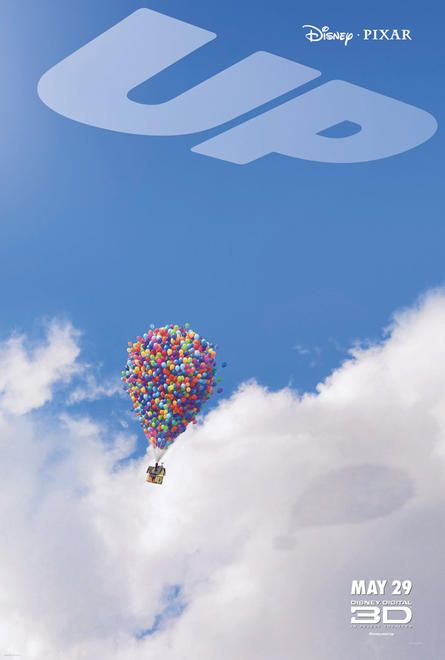
By James Zimmerman
If we take the word Cinema at its root (from the Greek kinesis, meaning "movement"), then pure cinema has been dying since the advent of synchronized sound. Too many movies are simply footage of people talking, or of a camera sitting idly by recording whatever happens to be going on in front of it. In its purest form, perhaps film continued to exist only in the creations of those (such as Chaplin and Hitchcock) who first mastered their trade and came to prominence during film's silent era.
But Pixar does an admirable job of bringing audiences a delicacy for the eyes. In a style first explored in Toy Story, expanded upon in Monsters, Inc., and brought to perfection in WALL·E, the animation studio succeeds in telling a tale via visuals with its latest offering: Up.
In the first fifteen minutes of Up, we are treated to a narrative - told almost entirely without words - of love found, promises made, and decades lived in the lives of Carl and Ellie. It's a poignant story, and the promises made and dreams lost in the picture-perfect montage bring equal parts laughter and tears.
Even once the film catches up to the present-day, and the actual dialogue begins, we are still offered visuals in favor of explanatory discourses. I found myself sitting in the theater thinking, "Ah yes, he's remembering the promise to his wife," and "Oh, he's trying to decide between carrying out his original plan and the possibility of a new adventure" - and such viewer-dependent interpretations are far richer than being verbally told what is happening (or what is about to happen).
It probably goes without saying that a film titled Up is bound to cast its cameras heavenward from time to time. The hero and his wife marry in a religious ceremony (Catholic, by the looks of it), but this brief scene tells us more about the humorous mismatch of the newly-related families than it does about their theist leanings. Later, Carl is shown wistfully speaking to a deceased relative, but it's unclear if he really believes he is addressing an angel, or if this is just a coping mechanism; a means for Carl to sort out his problems when he no longer has a live companion by his side. Russell, a juvenile character with membership in the Wilderness Explorers' Club, is confused by Carl's one-sided conversations. His club must not be sponsored by a religion.
If there is a downside to Up, however, it's in details. Pixar's normally tight - if not flawless - screenplays are rightfully lauded for their exceptional quality. Indeed, Pixar has a made a name for itself by acknowledging that its audience is not merely a roomful of wide-eyed children gobbling up whatever is offered. For the first time in Pixar's feature-length film-making career, however, there appear plot holes. Though, or course, we are willing to engage in a suspension of disbelief in a qud pro quo for an entertaining time at the theater, our verisimilitude is stretched a tad too thin in places here. Our hero, Carl, alights upon one end of a crescent-shaped plateau and quickly makes it his goal to walk to the other end. In several shots, we see the crescent as a jagged, barren landscape. During the trek, however, Carl must trudge through forests, high cliffs, caves, and other features. Worse, Carl agrees to a mission of mercy, in which it appears he completely back tracks his days-long journey in a matter of hours. Later, we meet up with Carl's childhood hero - a plot point that left me scratching my head: the chronology is completely baffling. For a film so rooted in reality at the outset, the bizarre, fantastical exposition of the final two-thirds of the film doesn't fit quite right. A scene of Kevin (a giant bird) fawning over Russell is particularly cringe-inducing. I kept wondering if Up would conclude with a dazed Carl waking from a dream.
But a flawed Pixar film is still, after all, a Pixar film. And that equates to a memorable experience at the theater and, I'm predicting, the Best Animated Film of the year.
Depiction, where explicit or implicit, of deities: 4/5
Depiction, whether explicit or implicit, of religion: 4/5
View of valuing this life as opposed to an afterlife: 5/5
Positive view of self-reliance: 5/5
Championship of reason: 4/5
Bottom line: 4/5

